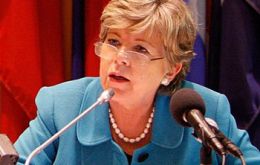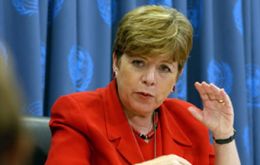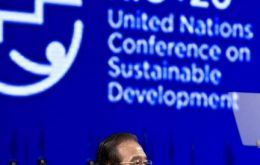MercoPress. South Atlantic News Agency
Tag: Alicia Bárcena
-
Thursday, September 5th 2013 - 02:20 UTC
Latam/China trade highly vulnerable: raw materials for manufactured goods

Over the past decade China has become a key partner for Latin America and the Caribbean with bilateral trade increasing 22 fold between 2000 and 2012, albeit with a strong deficit for Latin American countries, according to Alicia Bárcena, Executive Secretary of the UN Economic Commission for Latin America and the Caribbean.
-
Monday, August 12th 2013 - 07:25 UTC
Uruguay hosts four-day long UN conference on population development

Uruguay together with the Economic Commission for Latin America and the Caribbean (Eclac) and the UN Population Fund (UNFPA) are holding a four day conference in Montevideo as of Monday under the heading of First session of the regional conference on population and development in Latam and the Caribbean.
-
Tuesday, July 30th 2013 - 03:03 UTC
Eclac joins the club of Argentine government official stats disbelievers and says inflation is 20.5%

Following on the steps of the IMF (and World Bank) which has strongly questioned Argentine official stats (mainly inflation and GDP growth), the United Nations Economic Commission for Latin America and the Caribbean, Eclac, also joined the club of disbelievers since in its last report on the regional economy appealed to other stats’ sources.
-
Wednesday, July 24th 2013 - 20:47 UTC
Latam and Caribbean poised to grow 3% this year; poor performance from Brazil and Mexico

Latinamerica and the Caribbean are poised to grow 3% this year, according to the July Economic Survey of Latin America and the Caribbean, which is down from the previous April estimate of 3.5%. Slower growth in the region’s two largest economies Brazil and Mexico, and more modest activity in Chile, Panama and Peru have pulled the average down.
-
Tuesday, May 28th 2013 - 06:27 UTC
Further drop in Latam average regional urban unemployment, says UN agency

The average regional urban unemployment rate could drop by up to 0.2 percentage points to stand between 6.4% and 6.2% in 2013, the lowest rate in recent decades, according to a new report from the Economic Commission for Latin America and the Caribbean (ECLAC) and the International Labour Organization (ILO).
-
Tuesday, May 21st 2013 - 06:27 UTC
Massive money easing in rich countries making Latam currencies too strong

Currency strength due to stimulus measures in the developed world is currently Latin America's Achilles' heel, though the region's macroeconomic management is a bright spot, the head of the United Nations' body for the region said on Monday.
-
Tuesday, May 14th 2013 - 23:04 UTC
Record FDI year confirms Latam as commodities supplier but with little technology input

Latin America and the Caribbean received last year a record 173.361 billion dollars in foreign direct investment (FDI) (6.7% more than in 2011), despite an international context characterized by shrinking FDI flows worldwide, according to the United Nations Economic Commission for Latin America and the Caribbean (ECLAC).
-
Tuesday, October 2nd 2012 - 22:18 UTC
Big storm reaching Latam/Caribbean: growth estimate down to 3.2% from 3.7%

A weak global economy, mainly due to the difficulties faced by Europe, United States and China has affected growth in Latin America and the Caribbean. In 2012 the original growth estimate will fall from 3.7% to 3.2%, according to the latest estimate from the UN Economic Commission for Latinamerica and the Caribbean.
-
Friday, September 28th 2012 - 02:47 UTC
UN economic office warns on South America’s export trade vulnerability

Foreign trade in Latin America and the Caribbean will suffer from the economic slowdown that started in the second half of 2011. The value of regional exports will increase by 4% in 2012, whereas imports will grow 3% - according to estimates presented in the new Economic Commission for Latin America study released on Thursday.
-
Friday, June 22nd 2012 - 08:31 UTC
Premier Wen Jibao will address China-Latam relations at a conference in ECLAC

Premier of China, Wen Jiabao, will visit the headquarters of the UN Economic Commission for Latin America and the Caribbean (ECLAC) in Santiago, Chile, on Tuesday 26 June to deliver a lecture.
